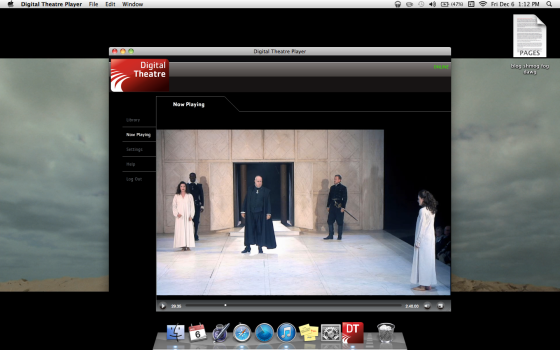iPhone or Samsung? Laptop or tablet? Technology is the priority. We give it all of our money and focus. So no wonder that it has penetrated its way into the theatre – and perhaps it should given how present it is in our daily lives (but that is a different conversation). One way in which the relationship between technology and theatre has come to fruition is through digital theatre.
Let’s clarify what ‘digital theatre’ means. This article is not referencing movies or series that were once plays (i.e. Tony Kushner’s Angles in America on HBO, or David Lindsay-Abaire’s Rabbit Hole directed by John Cameron Mitchell). This article is about filmed theatre. Unlike the movies and series, these filmed productions are clearly on and for a theatrical stage with a live audience present in the space.
Although digital theatre may seem more authentic to the original production then the movie adaptions, the digital is incredibly different from the original. The content of the production is the same, such as the script, costumes, and directional point of view. But the form is different. No matter how well captured, the filmed productions are not theatre. They are film; they are video. And there are a multitude of differences between the forms of video and theatre.

still from Digital Theatre’s film of the Royal Shakespeare Company’s As You Like It directed by MIchael Boyd
You can pause a production (rather than see a piece in its entirety in one sitting). Your perspective is chosen for you by the editor, constantly changing in depth and angle (rather than have one point of view from your seat, able to look wherever you like). You hear recorded, high definition audio from whatever speakers you are near (rather than live sound from the audience and performance). To see a production, you can stay in bed or take on transportation (rather than go to a theater). You can have a private viewing by yourself (rather than be with an audience in the same space and time). You can watch a production years after it was performed (rather than watch a show ideally for and by the context of that specific time and place).
Clearly, they are inherently different experiences because the medium changes. Film is not theatre, even if it is a film of a theater’s production.
For me, the biggest value that filmed theatre provides is the opportunity for people outside the center of privilege to experience a wider variety of theatre. There is a whole section of work that is exclusive because of cost and location. Someone can pay $4 on Digital Theatre to see a Royal Shakespeare Company production on their laptop. One can go to a local movie theatre and pay $7 to see the MET Opera. These options trump the original productions in expenses (of travel and hotels and tickets).
What can we learn from these filmed productions? If more and more productions are filmed, will people become accustomed to the convenience, comfort, and cost of filmed production and stop going to see theatre? Will young people first experience theatre in HD? Is the real concern whether young audiences will experience work in a theatre or a movie den, or whether they will experience it at all?
I’m not sure if you saw it, but I wrote a blogpost on a similar topic a while back. It’s https://dramalit.wordpress.com/2013/10/03/shakespeares-as-you-right-click/